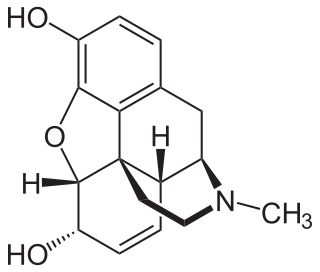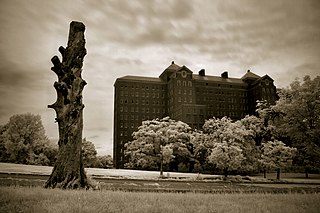
Psychiatric hospitals, also known as mental health hospitals, or behavioral health hospitals are hospitals or wards specializing in the treatment of severe mental disorders, including schizophrenia, bipolar disorder, eating disorders, dissociative identity disorder, major depressive disorder, and others.
Anti-psychiatry, sometimes spelled antipsychiatry, is a movement based on the view that psychiatric treatment is often more damaging than helpful to patients, highlighting controversies about psychiatry. Objections include the reliability of psychiatric diagnosis, the questionable effectiveness and harm associated with psychiatric medications, the failure of psychiatry to demonstrate any disease treatment mechanism for psychiatric medication effects, and legal concerns about equal human rights and civil freedom being nullified by the presence of diagnosis. Historical critiques of psychiatry came to light after focus on the extreme harms associated with electroconvulsive therapy or insulin shock therapy. The term "anti-psychiatry" is in dispute and often used to dismiss all critics of psychiatry, many of whom agree that a specialized role of helper for people in emotional distress may at times be appropriate, and allow for individual choice around treatment decisions.
A psychiatric or psychotropic medication is a psychoactive drug taken to exert an effect on the chemical makeup of the brain and nervous system. Thus, these medications are used to treat mental illnesses. These medications are typically made of synthetic chemical compounds and are usually prescribed in psychiatric settings, potentially involuntarily during commitment. Since the mid-20th century, such medications have been leading treatments for a broad range of mental disorders and have decreased the need for long-term hospitalization, thereby lowering the cost of mental health care. The recidivism or rehospitalization of the mentally ill is at a high rate in many countries, and the reasons for the relapses are under research.
The American Psychiatric Association (APA) is the main professional organization of psychiatrists and trainee psychiatrists in the United States, and the largest psychiatric organization in the world. It has more than 38,000 members who are involved in psychiatric practice, research, and academia representing a diverse population of patients in more than 100 countries. The association publishes various journals and pamphlets, as well as the Diagnostic and Statistical Manual of Mental Disorders (DSM). The DSM codifies psychiatric conditions and is used mostly in the United States as a guide for diagnosing mental disorders.

Geriatrics, or geriatric medicine, is a medical specialty focused on providing care for the unique health needs of the elderly. The term geriatrics originates from the Greek γέρων geron meaning "old man", and ιατρός iatros meaning "healer". It aims to promote health by preventing, diagnosing and treating disease in older adults. There is no defined age at which patients may be under the care of a geriatrician, or geriatric physician, a physician who specializes in the care of older people. Rather, this decision is guided by individual patient need and the caregiving structures available to them. This care may benefit those who are managing multiple chronic conditions or experiencing significant age-related complications that threaten quality of daily life. Geriatric care may be indicated if caregiving responsibilities become increasingly stressful or medically complex for family and caregivers to manage independently.

Opioid use disorder (OUD) is a substance use disorder characterized by cravings for opioids, continued use despite physical and/or psychological deterioration, increased tolerance with use, and withdrawal symptoms after discontinuing opioids. Opioid withdrawal symptoms include nausea, muscle aches, diarrhea, trouble sleeping, agitation, and a low mood. Addiction and dependence are important components of opioid use disorder.

The Kings Park Psychiatric Center, known by Kings Park locals as "The Psych Center", is a former state-run psychiatric hospital located in Kings Park, New York. It operated from 1885 until 1996, when the State of New York closed the facility, releasing its few remaining patients or transferring them to the still-operational Pilgrim Psychiatric Center.

Mad in America: Bad Science, Bad Medicine, and the Enduring Mistreatment of the Mentally Ill is a 2002 book by medical journalist Robert Whitaker, in which the author examines and questions the efficacy, safety, and ethics of past and present psychiatric interventions for severe mental illnesses, particularly antipsychotics. The book is organized as a historical timeline of treatment development in the United States.

The Soteria model is a milieu-therapeutic approach developed to treat acute schizophrenia, usually implemented in Soteria houses.

Psychiatry is the medical specialty devoted to the diagnosis, prevention, and treatment of deleterious mental conditions. These include various matters related to mood, behaviour, cognition, perceptions, and emotions.
Nathan Schellenberg Kline, M.D. was an American scientist, researcher in the field of psychology and psychiatrist best known for his work with psychopharmacologic drugs. Having been influential in the development of the very first antipsychotic and antidepressant medications in the 1950s, Kline is often regarded as the "father of psychopharmacology."

The Utah State Hospital (USH) is a mental hospital located in eastern Provo, Utah. The current superintendent is Dallas Earnshaw.
Addiction psychiatry is a medical subspecialty within psychiatry that focuses on the evaluation, diagnosis, and treatment of people who have one or more disorders related to addiction. This may include disorders involving legal and illegal drugs, gambling, sex, food, and other impulse control disorders. Addiction psychiatrists are substance use disorder experts. Growing amounts of scientific knowledge, such as the health effects and treatments for substance use disorders, have led to advancements in the field of addiction psychiatry. These advancements in understanding the neurobiology of rewarding behavior, along with federal funding, has allowed for ample opportunity for research in the discipline of addiction psychiatry. Addiction psychiatry is an expanding field, and currently there is a high demand for substance use disorder experts in both the private and public sector.

Jamaica Hospital Medical Center is a private, non-profit teaching hospital and emergency facility in the Jamaica neighborhood of Queens, New York City, on the service road of the Van Wyck Expressway at Jamaica Avenue. The hospital is a clinical campus of the New York Institute of Technology College of Osteopathic Medicine and provides clinical clerkship education for the college's osteopathic medical students.
Flushing Hospital Medical Center is one of the oldest hospitals in New York City. It survived a 1999 bankruptcy and subsequently affiliated first with the New York Presbyterian Hospital and then with the MediSys Health Network. The hospital is also currently affiliated with the New York Institute of Technology College of Osteopathic Medicine to provide clinical rotations for the college's osteopathic medicine students.
Parsons Hospital was "a small proprietary hospital in Queens" that was transformed into one focused to serving a local largely immigrant population. The hospital, which opened in 1963, closed in 1988, two years after it "was purchased by Asian American doctors."
Terrace Heights Hospital was a privately owned 166-bed hospital in Hollis, Queens that opened in 1947 and closed in 1984.
Hillcrest General Hospital was opened around 1962 by a physician who "was chief of medicine there for 25 years." Hillcrest, a private hospital, was then sold to an investor, who leased it to Osteopathic Hospital and Clinic. Osteopathic previously had acquired another hospital to which they subsequently relocated, and the 5-story building became St. Joseph's Hospital in 1985.
Eleanor Riese (1943–1991) was an American patient who sued a hospital for her right to refuse antipsychotic medication. The court decision significantly changed the approach to psychiatric patients.









